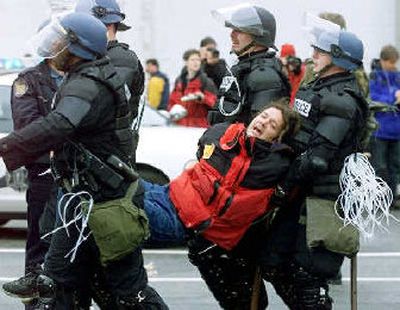WTO talks face uncertainty

GENEVA – Seattle, Cancun … Hong Kong?
Trade summits in the first two cities collapsed amid bickering and strident street protests. Now trade ministers hope Hong Kong, where they gather for next week’s World Trade Organization meeting, won’t become a third name on that list.
But they’ve done a good job of making that prospect a real possibility.
Talks leading up to the summit have reached an impasse over agricultural trade, with many negotiators blaming European Union unwillingness to further cut farm subsidies and tariffs.
But to avoid a complete failure, trade ministers will strenuously strive to make modest progress in at least some areas at the Dec. 13-18 meeting, experts say.
“Two scenarios emerge as the most likely outcomes for the Hong Kong ministerial: a breakdown in negotiations or lowered expectations that allow for progress toward a less ambitious trade round,” said Philippe de Pontet, an analyst at the Eurasia Group in Washington.
The Hong Kong meeting was supposed to produce a framework for a treaty outlining specific measures countries must take to cut trade barriers across a wide range of sectors, with the goal of concluding the so-called Doha Round by the end of 2006, five years after it was launched in Qatar’s capital.
But in recent weeks, members have openly admitted they will fail to achieve that objective in Hong Kong. In fact, some have already said it will be necessary to hold follow-up summit early next year.
WTO chief Pascal Lamy’s recently released draft text, which lays out the basis for negotiations on a final agreement for the summit, shows how far members are from agreeing on critical issues, including the liberalization of trade in farm products and manufactured goods.
“We do not pretend that this text represents agreement overall,” Lamy said.
“Although we may have ‘recalibrated’ the specific level of ambition for the Hong Kong meeting, it must nonetheless provide the launching pad for finishing the round in 2006,” he said.
The WTO’s 148 members – Saudi Arabia will be admitted as the 149th member ahead of the meeting – are under pressure to wrap things up by that date because the United States’ “fast-track” trade approval process expires on July 1, 2007.
The measure permits Congress only to approve or reject, without amendments, trade deals sent by the president for a vote. Without it, Congress would be free to reject specific points in any agreement, making it much more difficult to get the approval of the U.S., the world’s biggest trading power.
The current round of talks – meant to pay special attention to poor nations’ needs – is well behind schedule. The original goal was to craft a treaty by last year, but the collapse of a 2003 summit in Cancun, Mexico, set back the whole process.
Agricultural trade, vital to developing countries, has been the sticking point all along.
Poorer nations demand that richer countries, particularly the United States and those in the 25-nation EU, cut government subsidies of agricultural products and tariffs that block cheaper farm exports from developing countries.
The United States has proposed to cut its trade-distorting subsidies by 60 percent and its tariffs by up to 90 percent.
The EU has offered to cut its highest agricultural tariff rates by 60 percent and its average tariffs by 46 percent – but negotiators from the U.S. and developing countries say that isn’t enough.
A key issue for European farmers is whether they will continue to benefit from higher import tariffs on certain “sensitive products” – including beef, chicken and sugar – which help them remain competitive against lower cost imports from developing countries.
Meanwhile, the G-20, the key group of developing nations led by India and Brazil, have offered to cut farm tariffs by 25 to 40 percent, saying that richer nations need to make deeper cuts.